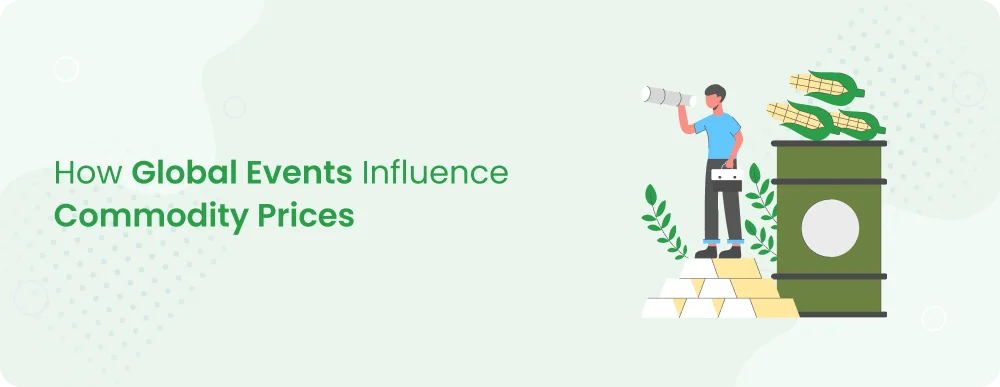How Global Events Influence Commodity Prices
Noor Kaur
18 Oct 2024Tags:
Featured
The prices of securities in the financial market depend on numerous internal and external factors, especially in the commodities market. Commodity trading involves speculating on the price movements of goods driven by supply, demand, and global events.
Well, how supply and demand influence commodity prices is obvious. If you are wondering how global events are related to commodity prices, this blog is for you! It will cover the connection between commodity prices and global events in detail.
The Connection Between Global Events and Commodity Prices
Global events have a direct and significant impact on commodity prices. Events such as geopolitical conflicts, natural disasters, economic policy changes, and pandemics can disrupt supply chains or influence demand, further causing price fluctuations.
For example, political instability in oil-producing regions can reduce supply, driving up oil prices. Conversely, economic slowdowns, like a global recession, often decrease demand, leading to lower commodity prices. Additionally, trade agreements, tariffs, and changes in currency values also shape commodity prices on a global scale.
How Political Instability Affects Commodity Markets
Political instability has a major effect on the commodity market, creating uncertainty and disrupting supply chains. When governments experience upheaval or major shifts in political power, it can cause significant fluctuations in commodity prices, further affecting trading opportunities worldwide.
Changes in trade agreements and regulations following political events can also shake commodity markets. The United Kingdom's decision to leave the European Union in 2016 (Brexit) is one such example. It caused widespread economic uncertainty, leading to fluctuations in commodity prices like wheat and sugar as traders and producers adjusted to the shifting trade environment.
Impact of Natural Disasters on Commodity Prices
Natural disasters like earthquakes, hurricanes, and wildfires can cause significant disruptions in the commodity market. These events can damage production facilities, disrupt supply chains, and lead to price spikes. For instance, hurricanes can damage oil refineries, temporarily increasing oil prices, while earthquakes may disrupt mining operations, reducing the supply of metals. Wildfires can destroy crops, affecting agricultural commodity prices.
However, natural disasters can also present trading opportunities for investors anticipating these disruptions. Predicting price movements, such as buying oil futures ahead of a hurricane, can lead to gains.
Strategies to Trade Commodities During Global Disruptions
Trading commodities during global disruptions carries high risks. Thus, strategic approaches are required to understand market sentiments and seize opportunities. Some of these strategies are:
Diversification of Assets
Diversifying across different commodities can help mitigate risk. By spreading investments among various assets, you can minimise the impact of a downturn in any single commodity. This approach allows for better resilience during times of market uncertainty.
Monitoring Global News
It is vital to stay informed about global events and their potential impacts on commodity market prices. Regularly following commodity news sources and economic indicators can provide insights into price movements and help traders anticipate shifts in supply and demand.
Utilising Technical Analysis
Technical analysis involves studying price charts and patterns to identify potential trends and reversals. During global disruptions, you can use this analysis to make informed decisions on exit and entry points, enhancing their trading strategies.
Implementing Stop-Loss Orders
Making stop-loss orders is a risk management strategy that helps protect against significant losses. By specifying a price at which a position will be automatically sold, you can limit your exposure during volatile market conditions.
Examples of Global Events That Have Shaped Commodity Prices
Global events significantly shape commodity prices, leading to notable fluctuations and trading opportunities. Here are some key examples:
Hurricane Harvey and Oil Prices
In August 2017, Hurricane Harvey struck the Gulf Coast, causing extensive damage to the oil industry. The hurricane led to refinery shutdowns, resulting in decreased oil production and a subsequent rise in prices. West Texas Intermediate (WTI) crude oil prices surged over 10% shortly after the event. Gasoline prices rose even more dramatically due to the disruption in refining capacity, while diesel prices remained relatively stable.
The Arab Spring and Wheat Prices
Beginning in 2010, the Arab Spring significantly impacted global wheat prices. Driven by economic grievances, protests led to instability in several Middle Eastern and North African countries, particularly Egypt and Tunisia. Concerns over supply disruptions and potential export restrictions pushed wheat prices up, with futures on the Chicago Board of Trade rising over 50% in early 2011.
COVID-19 and Copper Prices
The COVID-19 pandemic, which emerged in late 2019, profoundly affected copper prices, a critical indicator of global economic health. As lockdowns and restrictions were implemented, demand for copper plummeted, causing prices to drop to their lowest levels in over three years by March 2020. However, as countries reopened and introduced stimulus measures, demand for copper rebounded, leading to a subsequent increase in prices.
Conclusion
Now, it must be clear for you to understand how commodity prices are interlinked with the events happening around the globe. Thus, if you are a commodities trader or investing in commodities, ensure you use the strategies mentioned in the article above. It will allow you to buy the right commodity at the right time.
Noor Kaur
18 Oct 2024Related blogs
Sign up to our newsletter !
Share this article on
Recent articles
Tags:
Open a Demat Account in just 15 minutes !

Click on open
account below

Fill out some
basic details

Upload your
documents

Start trading in
24 Hours *
Commonly asked questions
Is Master Capital Services Limited SEBI registered?
Do you have a mobile app for Trading and Finance Management?
What services does mastertrust provide?
What is the minimum investment required to start trading with your company?
Is my personal and financial information secure with your company?
What is your customer support availability?





